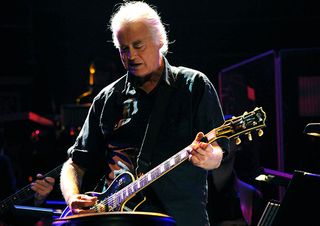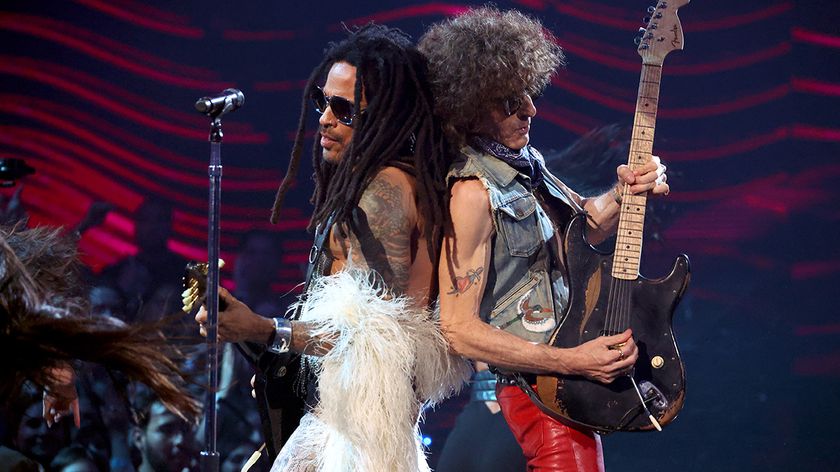Jimmy Page: Five Things We Learned from His “Stairway to Heaven” Testimony

Jimmy Page took the stand on June 15 to give testimony at a trial to determine the authorship of Led Zeppelin’s hit song “Stairway to Heaven.”
Page and Robert Plant are accused of plagiarizing the song “Taurus,” written by Randy California (born Randy Wolfe) and performed by his band Spirit on their self-titled 1968 debut album. “Stairway to Heaven” was written in 1970 and, like “Taurus,” features a descending chromatic arpeggio line performed on acoustic guitar.
Though Page was toting a guitar case when he arrived at the Los Angeles courthouse with Plant, the court wasn’t treated to a musical performance. Instead, Page spent much of the time on the witness stand answering questions presented by attorney Francis Malofiy, who represents California’s estate. California died in 1997 while rescuing his son from a rip current.
Malofiy’s questioning was aimed at establishing Page’s familiarity with Spirit’s music in general and “Taurus” in particular.
Wearing a black suit, white shirt and blue tie, the guitarist weighed in on topics ranging from his record collection to his guitar playing to his lack of familiarity with the Internet.
Here, we present five of the most revealing moments from his testimony.1. Page has a huge record collection.
A portion of his testimony focused on whether or not he had heard Spirit’s 1968 debut. That album is in Page’s personal record collection, though he said he has no knowledge of how it got there. By way of explanation, Page testified that the collection includes “4,329 LPs and 5,882 CDs,” and that he couldn’t possibly know every record in it. “To be honest, I could’ve bought it or been given it,” he said.
Get The Pick Newsletter
All the latest guitar news, interviews, lessons, reviews, deals and more, direct to your inbox!
2. He was, by his own account, an enthusiastic Spirit fan.
Page says he clearly recalls purchasing the group’s second and third albums, The Family That Plays Together and Clear, which were released in 1969. His collection also includes a live Spirit album.
Interviews with Page from that time suggest he was no casual fan of the group. During the trial, Page was presented with quotes from the press in which he enthused about Spirit and appeared to be a fan of their live shows, despite having testified that he’d never attended a Spirit concert. Though Page said some of those quotes could have been erroneously transcribed by reporters—“In those days, they still sort of jotted things down on notepads,” he said—there was no mistaking his words in a vintage audio recording on which he can be heard saying, “Spirit is a band I really love.”
3. Led Zeppelin used to include a Spirit song in a live medley.
Although Page isn’t certain how Spirit’s debut album ended up in his collection, he was familiar with its lead-off track, “Fresh-Garbage.” Led Zeppelin used to include the song’s main riff as part of an extended medley in their 1969 set list.
The medley was centered around a performance of “As Long As I Have You,” a song popularized by American soul singer Garnet Mimms. “Fresh-Garbage” was not released as a single, so Page could have known it only by hearing it on the album or the radio. The riff can be heard clearly around 6:24 in the clip of “As Long As I Have You,” below, recorded at the Fillmore West in San Francisco on April 27, 1969. Spirit’s “Fresh-Garbage” clip is below it.
- In his testimony, Page explained the riff’s inclusion by citing Led Zeppelin’s tendency to “chip a wink to what’s hot”—that is, acknowledge what goes over well with audiences. He was unable to answer when Malofiy asked how long the band performed the song during the medley. “I don’t know—I don’t have a stopwatch,” Page replied tartly.
As it turns out, Zeppelin performed the song when they shared a bill with Spirit and Vanilla Fudge in Denver, Colorado, on December 26, 1969. Page recalled that Zeppelin played first but left immediately in order to reach Seattle, where they were scheduled to perform the next day. He also claims he had no knowledge that Spirit was on the bill. “I didn’t think I was opening for Spirit,” Page testified. “I thought I was opening for Vanilla Fudge. I was excited about opening for Vanilla Fudge because I was a big fan of theirs.”
4. He doesn’t “do” the Internet.
Page was unaware that fans were comparing “Stairway to Heaven” and “Taurus” online because he doesn’t web surf. “I don’t do the Internet,” he said at the trial. “I’m not like everyone else here.”
Page said his son-in-law made him aware of the controversy. “Something appeared on the Internet,” Page said. “There was a buzz going on in the comparison [of “Stairway to Heaven” and “Taurus”] a few years ago. My son-in-law brought it up. I don’t do the Internet, so he played it for me. When I heard the orchestral part at the beginning [of “Taurus”], I knew I’d never heard it before.”
5. Like the rest of us, he’s well aware that he rocks on guitar.
Page testified that he started playing guitar at age 12 and was earning a living performing sessions by age 17.
“You had a gift at playing guitar,” quipped Malofiy. To which Page replied, “Well, yeah!” causing the courtroom to erupt with laughter.
Page may return to the stand today. Robert Plant will also testify.
Christopher Scapelliti is editor-in-chief of Guitar Player magazine, the world’s longest-running guitar magazine, founded in 1967. In his extensive career, he has authored in-depth interviews with such guitarists as Pete Townshend, Slash, Billy Corgan, Jack White, Elvis Costello and Todd Rundgren, and audio professionals including Beatles engineers Geoff Emerick and Ken Scott. He is the co-author of Guitar Aficionado: The Collections: The Most Famous, Rare, and Valuable Guitars in the World, a founding editor of Guitar Aficionado magazine, and a former editor with Guitar World, Guitar for the Practicing Musician and Maximum Guitar. Apart from guitars, he maintains a collection of more than 30 vintage analog synthesizers.

“We had 15 minutes left, and it was time to go… I just started playing that riff. Then Lenny goes, ‘Whoa, what’s that?’”: Lenny Kravitz guitarist Craig Ross reveals the serendipitous roots of a Kravitz classic

“The concept of the guitar duel at the end was just appalling”: Crossroads is an essential piece of '80s guitar lore, but not every guitar legend was a fan of the film










